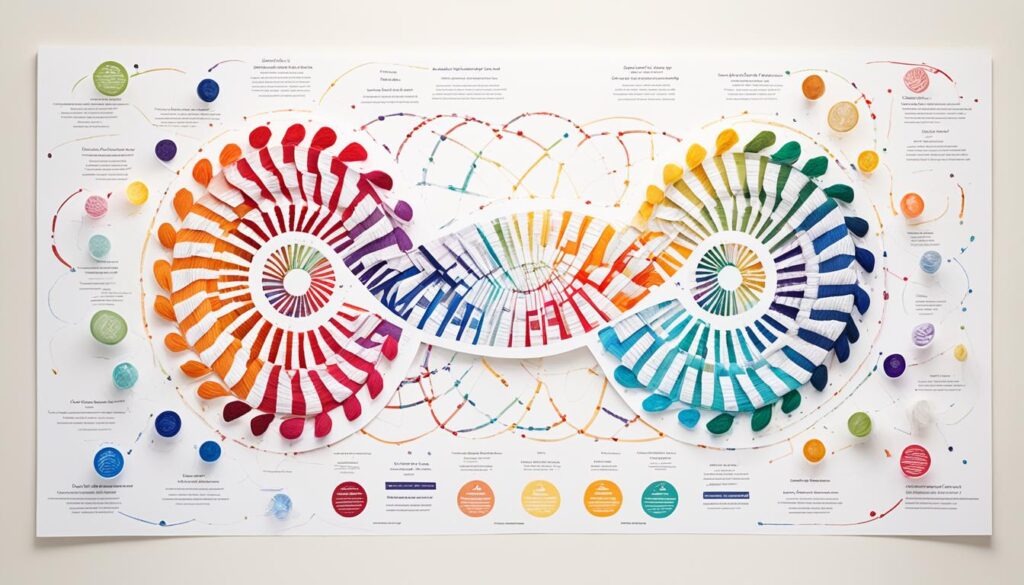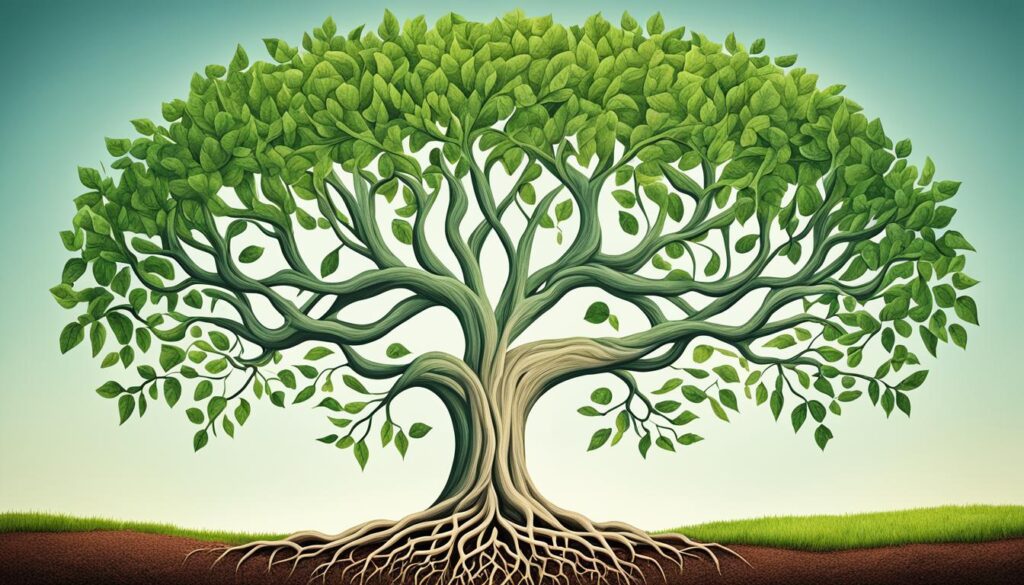“Your task is not to seek for love, but merely to seek and find all the barriers within yourself that you have built against it.” – Buddha
In a world where DNA testing and ancestry platforms have become popular, many people are discovering that their biological connections are not always as straightforward as they thought. This realization has led to a redefinition of the concept of family, highlighting the importance of chosen family and non-biological bonds.
Unconventional and non-traditional kinship relations are being recognized and celebrated, revealing the profound truth that family bonds extend beyond shared blood. These found families, often referred to as spiritual relatives or chosen family, are built on deep emotional connections and unconditional love.
Key Takeaways:
- Family isn’t always limited to biological connections.
- Chosen family are non-biological bonds formed through love and acceptance.
- Unseen bonds can be equally or even more significant than blood relationships.
- Non-traditional kinship relations challenge societal norms of what family means.
- Discovering chosen family opens up new possibilities for love and support.
Unraveling the Threads of the Past
In the age of technological advancements, many people turn to DNA testing and ancestry platforms to uncover their familial roots. These tools offer a glimpse into our genetic makeup, providing a window into the intricate tapestry of our ancestry. However, sometimes the results of these tests unveil life-altering truths that can shatter long-held beliefs.
One such revelation is the discovery that the father you have known all your life is not your biological father. This realization can bring about a whirlwind of emotions, ranging from shock and confusion to anger and sadness. It forces you to question your identity and reevaluate the bonds you have forged within your family.
Uncovering the truth about your biological father not only brings personal turmoil but also legal complexities surrounding estate planning. Inheritance laws vary by state, and in some cases, previously unrecognized children may be entitled to a share of the estate. This adds another layer of complexity to an already delicate situation.
Proactive estate planning becomes crucial to navigate these challenging circumstances. By addressing these legal complexities ahead of time, you can ensure clarity and protection for everyone involved. Having a comprehensive estate plan can help avoid potential legal battles, minimize emotional distress, and safeguard the interests of unrecognized children.
Let’s explore how proactive estate planning can help resolve these legal complexities and provide peace of mind.

The Importance of Proactive Estate Planning
Creating a comprehensive estate plan is a proactive approach to address the legal complexities that arise from discovering unknown biological connections. It allows you to outline your wishes regarding asset distribution, ensuring that your intentions are clear and legally binding.
Here is an example of how proactive estate planning can help:
| Scenario | Outcome without Estate Plan | Outcome with Estate Plan |
|---|---|---|
| A previously unrecognized child is entitled to a share of the estate. | Unresolved legal battles and potential disputes over asset division among family members. | Clarity and protection for all parties involved. Assets are distributed according to the individual’s wishes. |
As shown in the table above, without a comprehensive estate plan, the revelation of previously unrecognized children can lead to a myriad of legal battles and familial discord. By taking the time to plan ahead, you can create a framework that provides guidance to your loved ones, minimizing the potential for conflict and ensuring that every family member is treated fairly.
Estate planning attorneys can play a vital role in navigating these complexities and offering expert guidance. Their expertise can help you chart a course that respects your biological connections while protecting the interests of all family members involved.
By proactively addressing and planning for these legal complexities, you can mitigate potential challenges and ensure a smooth transition of assets, providing clarity and peace of mind to your loved ones.
The Need for Clarity in Legacy
As an estate planning attorney, you understand the importance of ensuring that your clients’ wishes are carried out after their passing. However, the story of discovering non-biological connections serves as a cautionary tale, highlighting the potential challenges that can arise in estate planning when unrecognized children enter the picture.
If someone dies intestate (without a will), the state’s laws dictate the division of assets. In many cases, these laws recognize estranged or previously unknown children as rightful heirs. This can lead to legal battles and disputes within the family, causing emotional and financial strain that could have been prevented with proper estate planning.
The Impact of Unrecognized Children
When unrecognized children are revealed, it can disrupt the previously known family dynamic and raise questions about asset division. These individuals may have a legal right to a share of the estate, which can create challenges for the family’s existing beneficiaries.
Without clear documentation and instructions in a will, siblings, half-siblings, and step-siblings could find themselves embroiled in complex legal battles over the distribution of assets. This not only creates emotional turmoil but can also deplete the estate’s value due to legal fees and prolonged litigation.
Securing Clarity and Peace of Mind
As an estate planning attorney, your role is to guide your clients through the process of creating a comprehensive estate plan that ensures their wishes are followed, even in the face of unexpected revelations. By proactively addressing potential challenges, you can help your clients avoid legal battles and protect their legacy.
Encourage your clients to have open and honest conversations with their loved ones about their estate plans, ensuring that everyone is aware of their intentions. This can help prevent misunderstandings and minimize the potential for disputes in the future.
Furthermore, emphasize the importance of documenting any unrecognized children or potential heirs in the estate plan. By explicitly addressing these individuals and their inheritance rights, your clients can provide clarity and prevent legal battles that could jeopardize the integrity of their legacy.
Take the time to thoroughly review and update your clients’ estate plans regularly. This ensures that any changes in family dynamics, such as the discovery of unrecognized children, are accounted for and addressed accordingly.
| Potential Challenges | Strategies for Clarity |
|---|---|
| Legal battles over asset division | Document and address unrecognized children in the estate plan |
| Emotional and financial strain on the existing family | Encourage open conversations and transparency within the family |
| Depletion of the estate’s value due to prolonged litigation | Regularly review and update the estate plan to address changes in family dynamics |
Protection Through Preparation
When it comes to ensuring the well-being of your loved ones, proactive estate planning is essential. By creating a comprehensive estate plan, you can protect your assets and ensure that they are distributed according to your wishes, even to those who may not have been recognized as part of your life. A well-crafted estate plan goes beyond asset division; it provides peace of mind and prevents potential legal battles that could strain familial relationships.
With a proactive approach to estate planning, you can establish a clear roadmap, minimizing ambiguities and reducing the chances of disputes. By documenting and communicating your intentions, you leave no room for confusion or misunderstanding. Your estate plan becomes a tool for guidance, safeguarding your legacy and ensuring that your loved ones are taken care of.
One of the key aspects of a comprehensive estate plan is asset division. By clearly outlining how your assets should be distributed, you prevent any potential conflicts or disputes among family members. This can be particularly important when it comes to individuals who may not have been previously recognized as part of your family, such as previously unrecognized children. Including them in your estate plan ensures their rightful share and avoids unnecessary legal battles.
Benefits of Proactive Estate Planning:
- Peace of Mind: Proactively planning your estate gives you peace of mind, knowing that your wishes will be respected and your loved ones will be provided for.
- Clarity and Protection: By clearly documenting your intentions, you minimize potential conflicts and protect your legacy from being subject to legal battles or disputes.
- Ensure Asset Division: With a comprehensive estate plan, you can ensure that your assets are distributed according to your wishes, including provisions for individuals who may not have been recognized as part of your family.
- Preserve Family Relationships: By preventing disputes and conflicts over asset division, proactive estate planning helps maintain harmonious relationships among family members.
By taking the time to plan ahead, you are not only securing your own future but also providing stability and peace of mind for your loved ones. A comprehensive estate plan is a powerful tool that ensures protection and clarity, offering a clear roadmap for asset division and preventing potential legal battles. With proactive estate planning, you can truly protect and provide for both known and unknown loved ones, leaving behind a legacy that reflects your wishes and values.

Love Beyond Blood
Society often emphasizes the importance of shared blood in defining family. However, the truth is that family is not solely defined by biological relations. Love is the fundamental ingredient that creates a deep connection between people, surpassing the boundaries of genetics. True family consists of those who love us unconditionally, support us, and accept us for who we truly are. These are the people with whom we feel comfortable being vulnerable, sharing our joys and sorrows, and forming emotional bonds that withstand the test of time. In some cases, chosen family, built on a foundation of love and mutual care, can even be stronger than the bonds of shared blood.
Embracing Unconventional Bonds
Family is not limited to those who share our blood. It extends to the individuals who have redefined the concept of family, becoming our chosen family. These are the people who have shown us unwavering affection and support, standing by our side through thick and thin. They have embraced us without hesitation, filling our lives with love and understanding. Chosen family transcends biology, emphasizing the significance of emotional connections and the powerful relationships we forge throughout our lives.
Whether these chosen family members are friends, mentors, or even colleagues, they form the backbone of our support system. They provide a safe space where we can be ourselves, free from judgment or fear. Chosen family is not bound by societal expectations or traditional roles; instead, it is a reflection of the love and acceptance we have found beyond the confines of shared blood.

The Strength of Emotional Bonds
The emotional bonds we form with chosen family are just as valid and meaningful as those formed through biology. These bonds go beyond simple genetics, encompassing shared experiences, empathy, and a deep understanding of one another. They are built on a foundation of trust, care, and respect, resulting in authentic relationships that withstand the test of time.
Chosen family members become our true family, providing the love and support we need to navigate life’s challenges. They celebrate our victories, offer a shoulder to lean on during difficult times, and encourage us to be the best versions of ourselves. These emotional connections transcend the barriers of shared blood, proving that family is not limited to biological ties.
Creating Lasting Connections
While shared blood may create an initial connection, it is the love and emotional bonds that truly define family. By embracing the power of chosen family, we open ourselves up to a world of deep connections and meaningful relationships that enrich our lives. It is through chosen family that we find true acceptance, a sense of belonging, and a support system that navigates the ups and downs of life alongside us.
As we celebrate the love and affection shared among chosen family members, let us remember that family isn’t always bound by blood. It is a choice we make to surround ourselves with individuals who uplift and inspire us, forming emotional bonds that stand the test of time. In the end, it is the love we give and receive that creates our true family, regardless of shared DNA.
| Shared Blood | Chosen Family |
|---|---|
| Biological connection | Emotional connection |
| Known genetics | Shared experiences |
| May have expectations | Acceptance without judgment |
| Can be limited by circumstances | Unconditional support |
Lessons from “Blood Ties”
The novel “Blood Ties” provides profound insights into the intricate dynamics of complex family relationships and explores the far-reaching consequences that stem from keeping secrets within a family. The story delves into the theme of redemption, reminding us that it is never too late to seek forgiveness and make amends for past mistakes. By challenging traditional notions of what constitutes a family, the book exemplifies that love knows no boundaries and can be found and cherished beyond biological connections. Moreover, “Blood Ties” underscores the impact of the past, as it illuminates how historical events and deep-rooted traumas shape the circumstances of the present, urging readers to acknowledge their familial history to break free from negative patterns.

Embracing the Power of Chosen Family
When it comes to building a strong support system, the power of chosen family cannot be underestimated. It goes beyond biological connections and embraces the beauty of forming emotional bonds with individuals who accept and love us unconditionally. Chosen family can be composed of friends, mentors, and even colleagues who become our pillars of support in times of need.
These unconventional bonds hold immense value and are as valid as those formed through shared blood. They offer a sense of belonging and create a space where we can be our authentic selves without judgment. Chosen family understands us on a deep level, providing the emotional connection and support that fuels personal growth and resilience.
In a world where traditional family structures can sometimes falter or fail to meet our unique needs, chosen family steps in and fills the gaps. It is a conscious decision to surround ourselves with individuals who uplift and inspire us, creating a chosen family dynamic that transcends societal expectations and norms.
The Unconditional Love of Chosen Family
One of the most beautiful aspects of chosen family is the presence of unconditional love. These bonds are not constrained by biology or obligation, but rather fostered and nurtured through genuine affection and care. Chosen family members love us for who we are, embracing our quirks, flaws, and strengths without judgment.
The unconditional love of chosen family provides a sense of security and acceptance that can be transformative. It allows us to grow and thrive, knowing that we have a group of individuals who will support and stand by us through thick and thin. These relationships create a foundation of trust and openness, enabling us to share our joys, sorrows, and aspirations without fear of rejection.
As the saying goes, “blood is thicker than water,” but chosen family challenges this notion by proving that love knows no boundaries. It teaches us that love is not limited by genetics but is a powerful force that can be found and nurtured in the most unexpected places.
By embracing the concept of chosen family, we open ourselves up to experiencing deep emotional connections and unconventional bonds that can enrich our lives beyond measure. These relationships remind us that family is not solely defined by blood but by the love and support we receive from those who choose to be part of our journey.
Conclusion
Family is no longer confined to the boundaries of shared blood. In today’s world, people are redefining the concept of family based on love, acceptance, and emotional connections. Chosen family, formed through non-traditional bonds, provides a sense of belonging and support that goes beyond biology. Whether through unexpected discoveries or intentional choices, individuals are discovering that family isn’t always determined by genetics.
By embracing the power of chosen family, you can create strong and meaningful relationships with those who love and accept you for who you are. These non-biological connections can bring immense joy, support, and fulfillment to your life. Family bonds are now built on a foundation of love and acceptance, transcending traditional notions of blood relations.
As we continue to redefine the concept of family, it is important to cherish and nurture the chosen family relationships in our lives. These relationships provide a support system that understands and appreciates us unconditionally. By embracing the power of chosen family, we can create a new understanding of what family means in the modern world, fostering deeper connections and a sense of belonging for all.
FAQ
What is chosen family?
Chosen family refers to non-biological connections and bonds that individuals form based on love, acceptance, and mutual care.
How can DNA testing and ancestry platforms impact family dynamics?
DNA testing and ancestry platforms can reveal unexpected familial connections, such as discovering that a known father is not a biological parent, which can bring personal turmoil and legal complexities surrounding estate planning.
What legal challenges can arise with unrecognized children and estate planning?
Laws regarding inheritance vary by state, and in some cases, previously unrecognized children may be entitled to a share of the estate. This can pose legal challenges and emotional distress for the previously known family.
How can proactive estate planning provide protection and clarity?
By creating a comprehensive estate plan, individuals can ensure that their assets are divided according to their wishes and provide for unrecognized children or non-biological connections. Proactive estate planning avoids potential legal battles and strain on familial relationships.
What is the significance of love in defining family?
Family is not solely defined by biological relations. Love is the fundamental ingredient that creates a bond between people. Chosen family, based on love and mutual care, can sometimes be stronger than the bonds of shared blood.
What themes are explored in the novel "Blood Ties"?
“Blood Ties” explores family dynamics, the consequences of keeping secrets, redemption, and the power of love beyond biological connections. The book challenges traditional notions of family, emphasizing the importance of love and acceptance in forming deep emotional bonds.
Who can be a part of chosen family?
Chosen family can encompass friends, mentors, colleagues, and anyone who provides unconditional love, support, and a sense of belonging. It includes non-traditional bonds formed through mutual care and affection.
How is family being redefined?
In the modern world, family is being redefined based on love, acceptance, and emotional connections. People are recognizing that family can extend beyond biological relations and encompass chosen family bonds.

